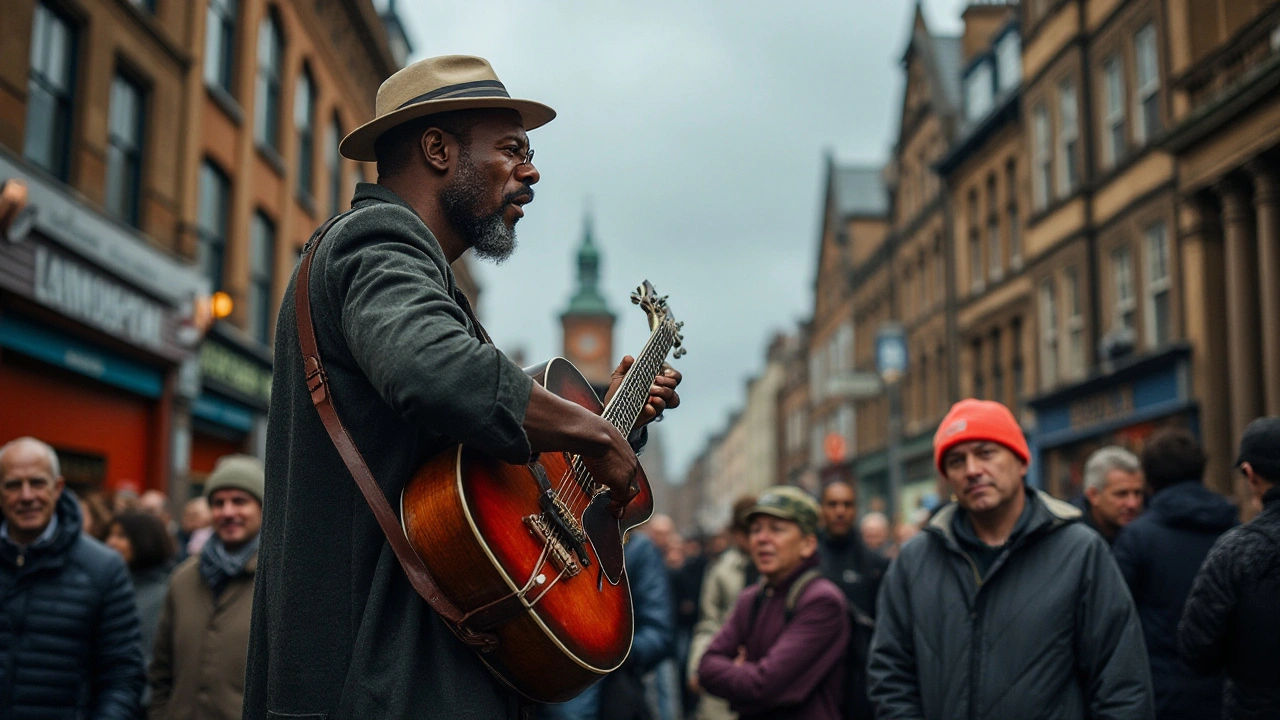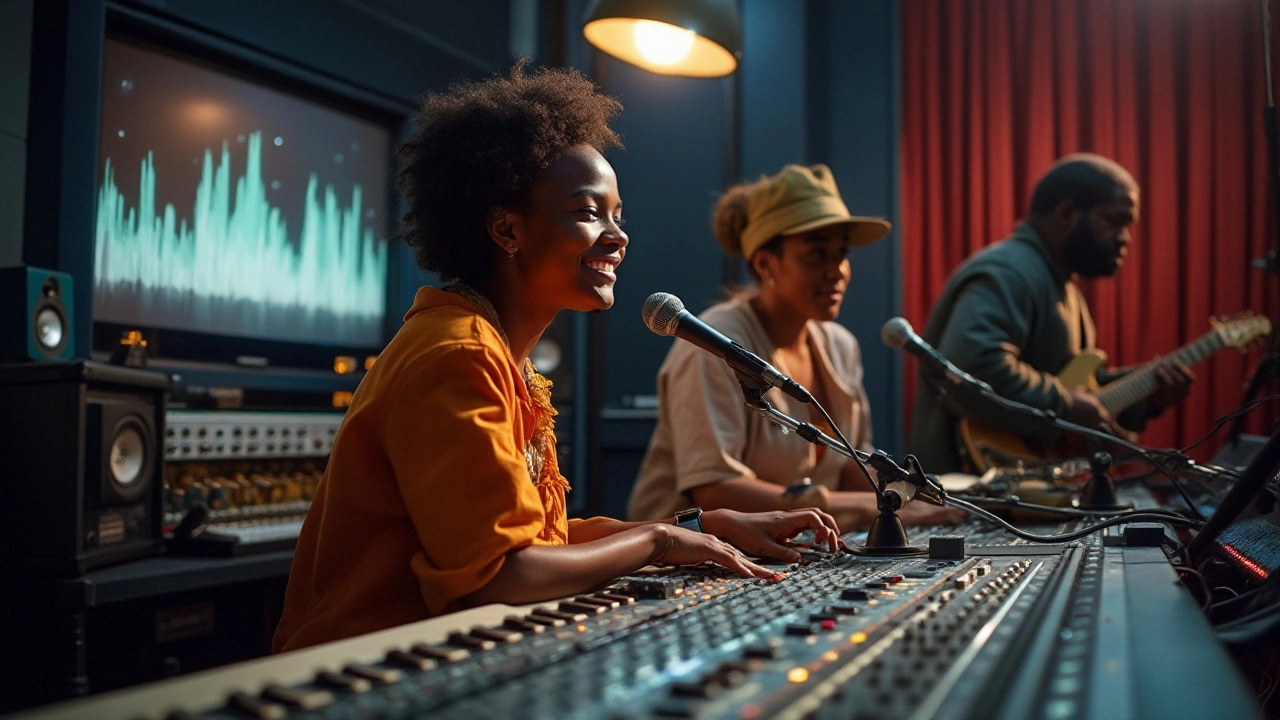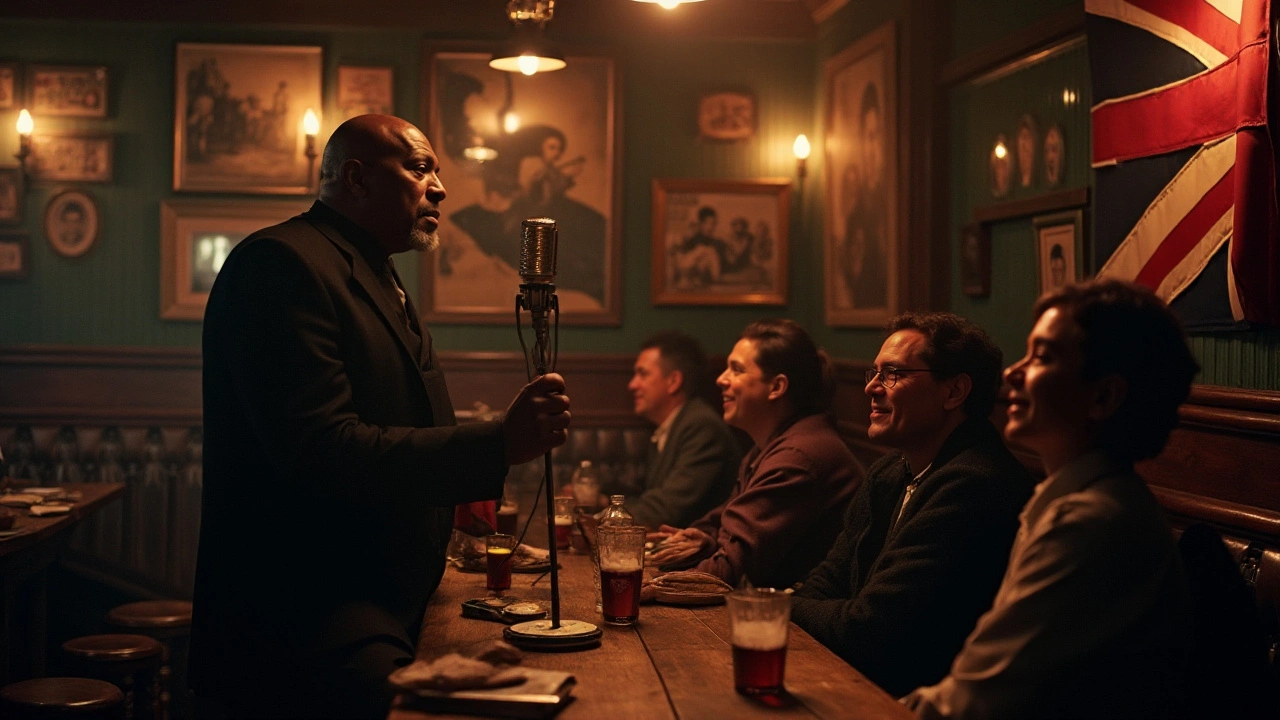Blues music echoes with a powerful, haunting resonance that captivates listeners even today. Born from the deep struggles and triumphs of African American communities in the early 20th century, this genre transcends time and culture. It's not just about sorrow and longing but also about celebration and community, a testament to the human spirit's resilience.
Its simplicity in form belies the depths of emotion it conveys, drawing people in with its soulful melodies and heartfelt lyrics. In a world constantly on the move, blues offers a moment to pause and truly feel — a rare oasis in the desert of digital distractions.
- The Historical Roots of Blues
- Blues as a Foundation for Modern Music
- Emotional Depth and Personal Connection
- Influence of Blues on Contemporary Artists
- The Future of Blues Music
The Historical Roots of Blues
In the dusty fields of America's Southern landscapes, blues music began its journey, woven into the fabric of everyday life for African American communities. This genre, with its heart-throbbing rhythms and raw emotion, sprung up in the late 19th and early 20th centuries, forming a profound connection between generations. Its origins can be traced to the deeply moving work songs, spirituals, and chants of enslaved African Americans, capturing not just the physical exhaustion but also the indomitable hope and resilience that defined their existence.
The Mississippi Delta, often cited as the 'birthplace of the blues,' played a significant role in nurturing early blues music. Its fertile grounds bore musical legends like Robert Johnson and Son House, who infused the genre with tales of love, loss, and everyday struggles. The early blues were poignant reflections of life's hardships, providing a voice to many who had none in society. These tales resonated not just because of their authenticity but because they spoke a universal language of emotion.
"Blues is easy to play but hard to feel," said Jimi Hendrix, highlighting the deep emotional connection required to truly embody the blues spirit.
By the 1920s, blues had started traveling beyond the Southern borders, as the Great Migration saw African Americans relocate to urban areas like Chicago and Detroit. This migration led to the evolution of blues, with electrification breathing new life into traditional acoustic tunes. Innovations by artists such as Muddy Waters and B.B. King transformed the genre, making it more appealing to wider audiences while preserving its core essence. Blues thus became a catalyst, influencing numerous other musical styles like jazz, rock, and even modern pop.
Interestingly, the evolution of blues in these urban landscapes also brought changes in societal and gender roles. As blues branched out, women like Ma Rainey and Bessie Smith rose to unprecedented prominence, bringing a raw, female perspective to a predominantly male domain. They sang not only of hardship but empowerment, challenging social norms and invigorating the genre with authenticity and boldness.
The musical legacy of blues is robust, a testament to its ability to both adapt and preserve. This adaptability was evident in the way the genre anchored itself into American culture, amid changing times and endless technological advancements. In cities and rural hamlets alike, blues clubs and small venues became sanctuaries where people gathered, not only to listen but to feel. Today, its historical roots continue to provide inspiration, as blues music remains a beacon of emotional connection and creative expression.
Blues as a Foundation for Modern Music
Blues music forms the bedrock upon which much of the modern music we enjoy today is built. This genre, which began in the late 19th to early 20th century, has influenced countless other genres, providing a template from which artists have drawn innovation and inspiration. Blues gave birth to jazz, rhythm and blues, rock and roll, and even hip-hop, each borrowing elements of blues' emotive storytelling and instrumental style. Its 12-bar structure and expressive guitar work have become staples in music production, illustrating just how fundamental blues is to the musical landscape.
The influence of blues is evident when examining the works of iconic musicians. The Rolling Stones, for example, famously channeled the raw energy and emotion that they discovered in blues music from American artists like Muddy Waters and Howlin' Wolf. Similarly, the legendary Jimi Hendrix infused blues-style guitar phrasings into his psychedelic rock style, creating something revolutionary. This cross-pollination of genres started a snowball effect, pushing the boundaries of popular music and capturing broader audiences.
Some might ask why blues has such a pervasive influence. Part of the answer lies in the simplicity yet profound emotional depth of its musical form, which allows artists to express their individual creativity while resonating with listeners on a deeply personal level. The common themes of love, loss, and endurance are universal and timeless, ensuring blues' relevance throughout generations. Noteworthy is the way in which blues can be a tool for both personal and political expression, making it particularly potent in periods of social change.
Emotional connection is another core element that blues and modern music share, and this bond is one of the reasons why new musicians continue to explore the genre. Many a modern hit has drawn from the blues' ability to convey stories through lyrics and instrumental interplay. For instance, Adele's songwriting often reflects the blues tradition of personal storytelling, capturing raw emotion in her vocals. As such, blues not only persists but also thrives as a foundational element influencing today's artists and their music.
“The blues tells a story in itself. It can make you happy or give you a feeling to cry. It captures something you are going through and is always true.” — David “Honeyboy” Edwards, American blues guitarist.
Even today, artists continue to pay homage to the giants of blues, keeping its legacy alive while crafting their unique musical journeys. This testament to its influence can be seen in the continuous revisitation of classic blues songs, reimagined for present-day audiences. The ability of blues music to interweave familiar themes with personal expression makes it an enduring and cherished foundation of modern music, showcasing its extraordinary vitality that continues to inspire and resonate across all genres.

Emotional Depth and Personal Connection
Few musical genres capture the raw essence of human emotion as powerfully as blues music. The blues delve into the depths of our collective and individual experience, serving as both a mirror and a balm for life's joys and sorrows. The emotional core of the blues stems from its origins, often reflecting the historical struggles of African Americans, creating a genre that is at once intensely personal and deeply relatable. With each bent note and heartfelt lyric, listeners find themselves transported to a place of sincerity and vulnerability, making an undeniable connection to their own life stories.
It's important to understand that blues music does not simply dwell on sadness. Instead, it explores the full spectrum of human emotion, evoking feelings of hope, longing, love, and even humor. This plurality is one of the reasons it continues to resonate with audiences today. The simplicity of the chord progressions and raw vocal deliveries allows the emotion to take center stage, ensuring that the narrative remains the focus. Whether it's the lament of lost love or the celebration of overcoming adversity, the authenticity present in blues lyrics bridges the gap between artist and audience.
A remarkable aspect of the genre is its ability to convey these complex emotions with minimal instrumentation. The quintessential sound of a resonator guitar, a mournful harmonica, and a deep, soulful voice can encapsulate a world of feeling. This minimalism is precisely what enables the music to speak so eloquently; there are no extraneous elements to detract from the heartfelt message being delivered. When legendary artists sing, it's like they're telling secrets, their voices carrying truths that might not otherwise be spoken aloud. As musician Buddy Guy once said,
"The blues is a feeling, like no other kind of music."
In modern times, the ability of blues music to evoke such potent emotions is being recognized by a new generation of musicians and listeners. These individuals, drawn to its sincerity, find solace in the honest tales spun by blues legends. They are exploring the emotions that the blues evoke by infusing their own narratives and experiences into the traditional framework of the genre. This cyclical process of renewal and homage ensures that the blues maintain their relevance, continually speaking to human truths across ages and cultures.
Influence of Blues on Contemporary Artists
The impact of blues music on contemporary artists is profound and extensive, shaping genres that many might not immediately link back to it. From rock and roll to jazz, the echoes of blues can be heard in the riffs, rhythms, and lyrics of many a modern hit. Blues' distinctive twelve-bar structure and its emotive lyrical style have been borrowed, adapted, and infused into countless songs that define our era. This music's enduring legacy is its unique ability to speak directly to the human condition, transcending spoken language to communicate feelings and experiences in their rawest form.
Many artists, across different music genres, openly acknowledge their debt to the timeless genre of blues. Eric Clapton, known for his incredible guitar work, has often cited blues legends like B.B. King and Robert Johnson as his greatest influences. Similarly, Adele's deep, soulful voice and emotional delivery in her songs hint at a strong blues influence. She once mentioned in an interview, "When I write my music, I want to evoke the soul-stirring elements that blues artists did so naturally. It’s about truth and honesty in music."
The influence isn't solely limited to Western music. In recent years, artists in genres such as K-pop and Afrobeat have woven blues elements into their work, creating hybrid sounds that captivate global audiences. The blues' inherent ability to adapt and mesh with other styles is a testament to its versatility and appeal. Even in hip-hop, an art form often seen as a modern rebellion, blues plays a surprise role. In its storytelling essence, hip-hop echoes the narrative-driven strength of traditional blues, proving the genre's dynamic influence.
The Art of Storytelling Through Blues
Blues music's impact on artists today also extends into lyrical expression. Much like blues artists of the past who sang about personal woes, contemporary musicians continue this tradition by exploring personal and social issues through their music. The blues have shown that simplicity in songwriting can go hand-in-hand with emotional depth, an insight Madonna expressed once by saying, "The blues teach you that sometimes the fewer the words, the louder the truth." This deeply personal approach to storytelling is instrumental in fostering a connection between the artist and their audience.Aside from individual artists, bands like The Rolling Stones and Led Zeppelin have famously tapped into the emotional power of blues to bring a raw energy to their performances. In fact, many key figures in rock history began their careers by playing blues covers, illustrating the foundational role blues has played in the development of modern music. This ongoing influence can be visualized in the way blues festivals worldwide continue to draw crowds, indicating not only nostalgia but an appreciation for its continued relevance.
In a way, the influence of blues music on contemporary artists is akin to the telling of an ancient story that, with each new teller, gains new life and perspective. It's a creative lineage that bridges past struggles with present realities, a comforting reminder of humanity's shared journey. As artists continue to explore their roots and innovate their sound, the blues remain a silent partner at their side, guiding them with its rich, emotive history. This multi-generational dance keeps the spirit of the blues alive, ensuring its resonance for years to come.

The Future of Blues Music
The journey of blues music from its origins to its current status as a global symbol of emotion and resilience is a tapestry woven with countless stories. As we look ahead, the future of this timeless genre appears lively and inspiring. In today's rapidly evolving musical landscape, blues not only survives but thrives, continually evolving while retaining its essential core. This adaptability promises that blues will continue to be a beacon of emotional connection. As we delve deeper into the digital age, accessibility to this deep-rooted genre expands with resources at our fingertips, introducing fresh ears to traditional sounds and enticing new generations of artists to explore and reinterpret classic elements.
Modern artists and producers are experimenting with innovative techniques to give these old sounds new life. Breakthroughs in technology have opened pathways that blues musicians of the past could only dream of. With every pluck of the guitar string, every mournful wail, a new chapter opens, beckoning a curious audience keen to experience the evocative storytelling unique to the blues. This willingness to innovate, coupled with a firm grasp on tradition, allows the genre to surface in new forms like blues-rock or even electronic blues, blending diverse styles seamlessly.
The impact of grassroots movement and social media on the blues cannot be understated. Young artists are discovering the joys of blues music through platforms designed to lower the barrier of entry. One notable example is the annual International Blues Challenge held in Memphis, TN, which showcases talent from around the world. Recorded content from these events becomes shareable and viral, making the genre steadily gain traction with a fresh audience. This grassroots awakening sees blues expanding globally, with burgeoning scenes in places as diverse as South America, Asia, and even Scandinavia.
Educational programs are thriving, encouraging new musicians to delve into the complexities of the genre. Schools and colleges offer courses specific to blues, ensuring students understand its historical significance and technical proficiency. Seminars and workshops helmed by veteran blues musicians spark passion in willing learners. There are increasing opportunities for collaboration across different musical genres, which has led to delightful genre-mashing. This trend continually breathes vitality into traditional blues, promising significant longevity.
Blues music's future is also shaped by festivals dedicated entirely to celebrating these rich traditions. Events like the Chicago Blues Festival draw thousands of fans annually, fostering community among enthusiasts of all ages. These gatherings are not just celebrations of music but are educational and cultural experiences as well. They offer young artists opportunities for exposure and veterans platforms to collaborate and mentor. The community surrounding these events is vibrant and ever-growing, thirsty for knowledge and exploration of blues’ evolving styles.
"The blues is an expression of anger against shame and humiliation," once said blues legend John Lee Hooker, and this timeless form of musical expression remains as relevant as ever.
In the lifeline of music genres, blues stands tall, representing the unbroken human spirit. With modern technology, educational programs, and a global audience yearning for authenticity, the future of blues music looks exceptionally promising. This surge epitomizes how deeply embedded it is in the human experience, thus ensuring its place in the sonic tapestry of the future.

